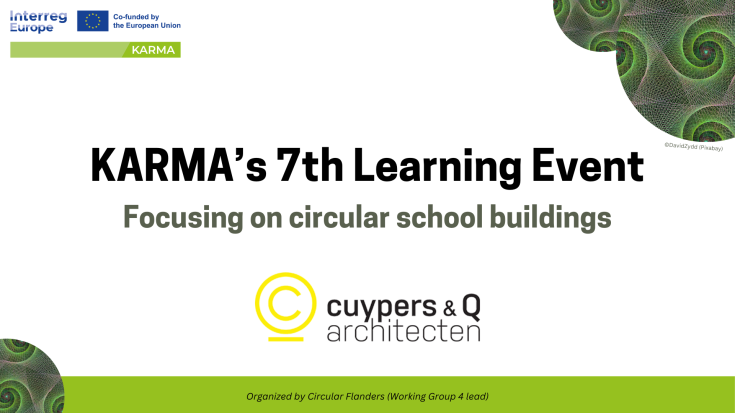KARMA’s 7th online learning event (WG4)
On May 8th, 2025, Circular Flanders (BE), a partner in the Interreg Europe KARMA project, hosted the second workshop of Working Group 4 (WG4): Governance of Climate Plans and Circular Economy Strategies. The session focused on a timely and complex issue -integrating circular economy principles into the construction and renovation of school buildings.
While significant investments are currently being channeled into upgrading school infrastructure, many of the traditional development pathways still fail to accommodate circular ambitions. Circular approaches are often perceived as either too costly or overly ambitious, which can lead to their deprioritization during early planning stages. WG4's workshop aimed to shift this narrative by equipping stakeholders with tools and insights to support circular thinking from the outset.
Sofie Borré from Cuypers&Q shared findings from a recent research project that aims to empower school principals and boards in defining their circular goals early in the planning process. Her presentation provided a practical framework to help clients, school administrators, and policymakers assess their level of ambition and determine incremental steps toward more sustainable outcomes.
Borré also presented concrete examples of circular school construction, including the impressive transformation of the Alfa-college campus in Hoogeveen, the Netherlands. Originally comprised of outdated buildings from the 1960s and 1990s, the school faced increasing energy and maintenance costs. Its complete overhaul not only addressed these challenges but also turned the site into a benchmark for sustainability and innovation in the renovation of school buildings.
The workshop emphasized the importance of involving all stakeholders from the very beginning of construction projects to foster a shared vision for circularity in the education sector.
As Circular Flanders continues its work within the KARMA project, the insights and tools shared during this session will support policy learning and replication across regions.
Author: Lead partner (Free and Hanseatic City of Hamburg)

